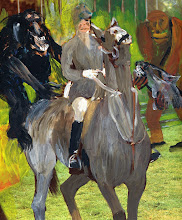My chosen one, Saint Lyman, is for the rest of the English-speaking world a so-called ‘shit’. Of course that suits me fine, I adhere to all forms of inversion, confusion, perversion and diversion – why shouldn’t I squander my affections on someone the world wants to discard. They don’t treat him like a man who is already dead, but as one who had never been born. I would have liked to write his apology like Plato for Socrates, but I knew nothing of him except what I read in the obviously biased accounts in the English newspapers. Why they should hate him so much – brand him a ‘rotter’ – is a mystery. He comes out of the same school as all the rest of them, thankfully though he is neither a pederast nor a paedophile, nor homoerotic, nor otherwise ‘kinky’, I think he is rather sexually indifferent, certainly no Bluebeard. He seems to be a man of logic and I do so capitulate to logic. He is a liar and a gentleman, QC, MP and SOB. He is a knight errant who to no lesser degree than Amadis and the whole guild of chivalry made himself destitute for the ladies – to some of whom he was married and not even at the same time.
Where in the hell did I read that Homer didn’t care much for Ulysses because he saw him as a compulsive liar? The ancient Hellenic world did not believe in subterfuge – any victory gained by such means disqualified itself. The Iliad ended ignominiously. That’s why it was the first modern battle. John Lyman, the classical rotter is a modern hero and a Faustian saint. What was his terrible crime? Those paltry sums which he pried from his ‘victims’ (and who can say that he did not earn those sums for cavalier services, I certainly would not begrudge him any nest eggs of my own and I plan to make that plain to him, I’m grateful to Stock-Krause for forcing my hand) – those womanly savings were the means to his own demise. Not in the sense an otherwise astute typical English biographer might think – pride before the fall and all of that beloved English pantomime, not that – but because he wanted to be made to suffer, to demonstrate meekness. What is more knightly than humbling oneself for a lady? Although Lyman is as gregarious as any Englishman he has remained uncharacteristically silent, which is of course the ultimate proof of the gentleman.
I spent the whole morning thinking about my friend the heresiarch Saint Lyman held prisoner in the pits of the English Inquisition. It was more work than I had done in years, piling up remorse, not my own. I distinctly sensed him near me, looking over my shoulder much of the time, honing my mercilessness and communicating his prophecies to me via the central heating so similar in sound to the old bass fiddle he played while at Oxford.
Everything he intimates is in a slightly out of tune key of A but much of it is unfortunately drowned out by the unceasing babble of my Spanish tenants, the Angilos. Discomfort always brings my thoughts to Lyman. I would gladly be Sancho Panza for this sad English knight. Why doesn’t he say anything in his own defence? If he speaks then only to goad his punishers, fully aware which mock swagger of his will elicit their most revengeful zeal. The only vice of which one could rightly accuse him is being a glutton for punishment. Hot in the indulgence of this gluttony, he met up with her. She was not the first, nor the fourth, but most probably the last stop so far on his knight errantry, offering damsels in distress fake Swiss bonds at high yield interest and for a while his inimitable self.
I wonder what they have been doing to the recalcitrant old tramp, have they been trying any of their ‘treatments’ on him. Have they tried to spook his meanness out of him with the hair in the neck trick? A trick worthy of being displayed in the Pitt-Rivers Museum, in a showcase on how to mortify one’s enemy. A thread, thicker than hair but not as thick as a rope, is spliced with skin, a flap of skin is pulled out and sewn down onto the neck the way one would stitch up a stuffed Christmas turkey. An infection naturally ensues attracting hidden unreachable deeper infections into its pus filled bed. If he were to object to this therapy, they might decide to sew him on various places to his mattress. Whilst lying there like a piece of rawhide other prisoners could come over him with whatever manner of implement they have managed to stash in their cells, such as spoons to ladle out parts of hands.
Lately I have been writing things down whose perishability has so accelerated; they are no longer on the page the next morning. I learn to live with it, it is the converse of fading eyesight – not my eyesight fades but the object of my eyesight, in this case my handwriting. There is nothing left to see so what good is my eyesight then? Margarete the bakery sweep who doubles as lay nurse for some of my more derelict tenants is not all sweetness and light, but those sorts seldom are. She is a preventer, not a destroyer like me, but someone who keeps things from happening. Sometimes prevention is a good thing. I have instructed Heribert to strew sand and salt on the icy pavements so that the elderly will not fall down and break a hip like that indestructible Englishman Jeffrey Bernard, who has more lives than a cat, about whose progress against hope I read from time to time for a treat. Is he not supremely fit ‘to sweep the tavern doorstep with cheek and hair’? I like reading about his escapades when I visit Georgie von Regenheim my legal counsel and business friend. My first question when I come into his chambers and seat myself on the other side of the wide mahogany table, much like Churchill’s writing desk, is how is our Jeffrey doing? (By tacit agreement we refuse to believe the malicious rumor that Jeffrey Bernard is really dead. As far as we are concerned he is just slightly more unwell.) Georgie pulls out an old magazine from behind some notary files. I never fail to feel some titillation. By saying Georgie is my business friend I am not in any way diminishing the importance of our friendship. All my relationships are business relationships but he is my only friend. One has business enemies en masse. Georgie was an Anglophile like me. He had an American grandmother. Georgie was a real landlord with a bulging portfolio of properties. Whenever I visited him it is as if I had entered Walter Benjamin’s “cloudless kingdom of perfect investments upon which no money ever falls”. Although the tenants in his buildings were forced to live with packed suitcases – Georgie was infamous for his sudden eviction notices.
I have been seriously considering recommending to Stock-Krause that she send Jeffrey Bernard a ticket to come and visit her as a goodwill gesture to a fellow amputee. She has been looking so forlorn since she heard about my honourable friend Saint Lyman, indeed he is my second friend after Georgie. There are many taverns down by the river, they are in the hands of the Greeks, and in one of them I am sure there is a bottle with Jeffrey Bernard’s name on it. The best place to start is in Club El Alamein, the losers sit there and try to figure out not why but if they have lost. No, that’s not quite true, they do know they lost the battle but are sure they have won the war. The battle has been downgraded in the course of the years to a mere stability crisis. Hans who also played the bass fiddle in the El Alamein Café Ensemble cultivated some nautical mannerisms à l’Anglaise. He knew something about the different layers of the earth’s crust as well. Jeffrey Bernard could talk to him about not going to sea. One reason Hans gives for not going to sea is that ships sink so often. He is not a coward only an amateur statistician. He gave me a lecture about it one time in those days when I still came and went in public houses, in this case El Alamein.
The town used to be full of fishermen. Their coat of arms still shows a Petrus as the centrepiece of some mackerels in the shape of a cross – vaguely reminiscent of an Archimboldo.
I liked the river town because I thought that it looked so English. As I imagined a small English town would look. Dingy red brick facades, scorbutic dwarf trees bearing three grey curled leaves in spring and losing them by mid-summer. Tiny rear gardens without sunlight. You cannot buy fresh fish anywhere in town. Greeks stick their poles in the brackish waters and are taunted by mangy looking local urchins and other Greeks come out of the taverns, down the steps, slide more than walk to the banks, frying pans in their upraised hands meant for the children who then run away shouting insults and curses over their shoulders. One of them looks like the younger son of Angilo, my Spanish tenant. The child stunted its own growth by all of its creeping about and quickly disappearing around corners. His older brother was the only one growing and he just got fatter. Now the younger one runs with the pack. They scramble back up the bank and jump over the train tracks.
Until now there has never been a train going past at the right moment.

















.jpg)














No comments:
Post a Comment